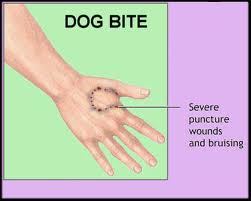Depending on its severity, an animal bite can lead to serious, life-threatening 
Pets, like dogs and cats, provide companionship to humans. The loyalty, friendship and love that our pets offer can make anyone endeared to them. Thus, these animals can easily become part of the family. Unfortunately, they also pose some risks. Household pets, especially dogs and cats, are the leading causes of animal bites in the country. Every year over a thousand of people receive first aid for animal bites, with majority of them requiring further treatment at an emergency department or a doctor’s clinic.
Animal bites are often frightening, and can even cause medical emergencies. Although bites due to wild animals are less common, they are often more dangerous because of the threat of rabies – an irreversible and life-threatening infection of the central nervous system. When bitten by any wild animal and even household pets, the victim would usually require anti-rabies and anti-tetanus vaccine to prevent possible serious complications.
Animal bites can range from minor to serious injuries but regardless of the severity all injuries should not be disregarded. Here are some guidelines to consider when providing
first aid for animal bites:
• If there is an obvious break in the skin, treat it as if a minor wound. Wash the
injured site with soap and water, apply an antibiotic cream, and cover it with clean bandage.
• If you do not have an updated tetanus immunization (no tetanus shot given within the last 10 years), you should get one, at least within 48 hours.
• If the bite causes the skin to become badly torn or creates a deep puncture,
control the bleeding by applying pressure over the wound. Seek medical attention immediately.
• If you develop fever or signs of infection (pain, redness, swelling, bad smell, or drainage from the injured site), visit your doctor right away.
• If you have been bitten by an animal that acts strangely, go to the nearest ER or see your doctor right away. The same is true if you have been bitten by any wild animal such as skunks, bats, foxes or raccoons. Animals displaying strange behavior may have rabies. An unprovoked attack is typically a strange behavior. Although rabies infection in humans is rarely caused by cats, dogs, rodents, and plant-eating animals, you should still seek your doctor’s help in case bitten.
Providing immediate first aid for animal bites can prevent potential complications arising from the injury, particularly infection and bleeding. As in any emergency, prevention is still better than cure. Here is some final advice on how to prevent animal bites:
• Teach children how to behave around animals and to
avoid unfamiliar animals. Also make them realize that any animal may bite if they are injured, ill, harmed, startled, or frightened. Even our dear pets may bite when injured, disturbed while eating or sleeping, or startled by sudden noises.
• Do not leave young children around animals.
• Make sure to keep your tetanus immunization up-to-date.